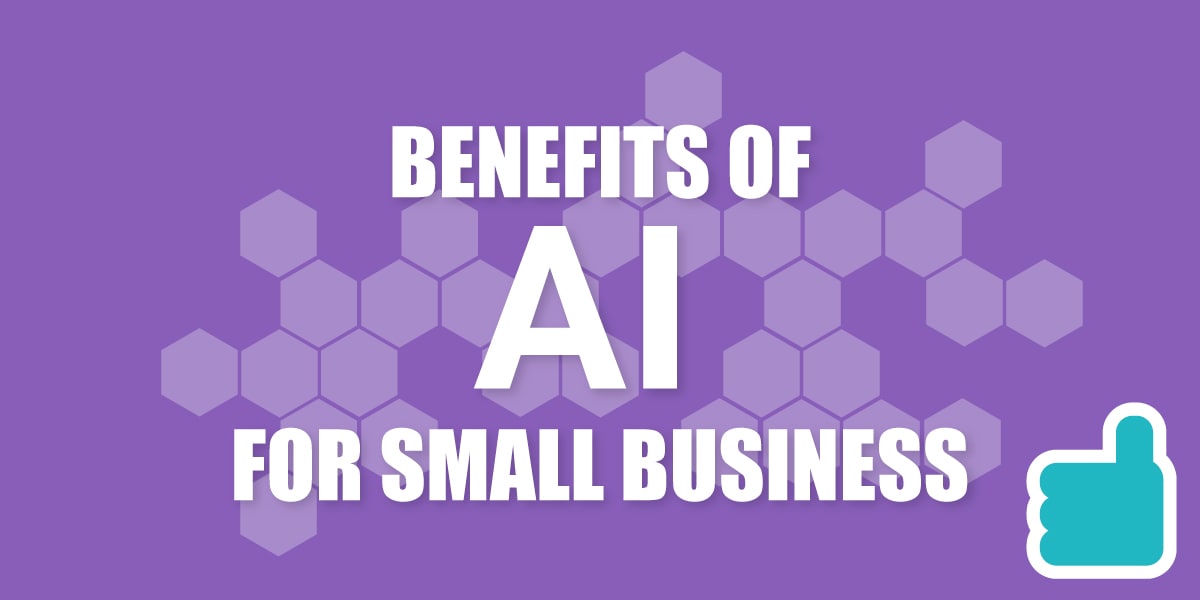AI in Content Creation: How Small Businesses Can Benefit
Small businesses are increasingly using artificial intelligence (AI) to help streamline their business management, help engage with customers, and improve their marketing reach through content creation.
With AI-powered tools, creating high-quality, engaging content has become easier and more accessible. This post will explore how AI can benefit small businesses in content creation, covering tools, strategies, and best practices to help you make the most of this powerful technology.

Why AI Matters for Small Businesses in Content Creation
Creating content is essential for digital marketing, yet it can be time-consuming and costly for small businesses with limited resources. AI offers solutions to some of these challenges, automating repetitive tasks, optimizing content for SEO, and even generating ideas.
By using AI-driven content tools, small businesses can maintain a steady flow of quality content that captures audience attention and improves their online presence.
Key Ways Small Businesses Can Use AI in Content Creation
Small businesses can leverage AI in content creation across multiple marketing channels, including social media, emails, and website content.
Here are a few key ways AI can make an impact on your business:
1. Generating Content Ideas
One of the biggest obstacles in content creation is coming up with fresh, relevant ideas. AI tools analyze trending topics, keywords, and audience preferences to generate ideas that are both engaging and relevant.
- Trend Analysis: AI can analyze trends in your industry to identify topics that resonate with your target audience. This helps small businesses create content that is timely and on-point.
- Keyword Research: AI-powered SEO tools like Ahrefs, SEMrush, and BuzzSumo can identify high-ranking keywords and content topics, giving your posts a better chance of ranking on search engines.
- Content Ideas Generators: Platforms like AnswerThePublic and HubSpot’s Blog Ideas Generator use AI to suggest blog topics based on your niche, allowing you to focus on creating rather than brainstorming.
If you run an online store selling exercise gear, AI can analyze trending searches to recommend blog topics like “Top Workout Gadgets of the Year” or “How to Choose the Best Resistance Bands for Your Routine.”
2. Automating Content Creation
AI tools are becoming increasingly capable of generating written content that sounds natural and engaging. Although AI-generated content might need human refinement, it can significantly reduce the time and effort required for writing.
- AI Writing Tools: Tools like Jasper and Copy.ai create marketing copy, social media posts, and even blog intros. These tools allow small businesses to generate quality content for various platforms quickly.
- Automated Emails: AI tools like Mailchimp and Constant Contact can compose personalized email content based on customer behaviors, ensuring that each customer receives a message that’s tailored to them.
- Social Media Captions: AI-powered tools like Lately generate multiple social media posts from a single piece of content, saving time and ensuring consistency across platforms.
For example, an e-commerce shop can use Jasper to create product descriptions, blog intros, and social media captions in minutes, allowing team members to focus on other tasks.
3. Enhancing SEO and Content Optimization
AI-driven content optimization tools help small businesses create content that ranks well on search engines, helping to increase visibility and attract more potential customers.
- SEO Optimization Tools: AI-based SEO tools like Yoast SEO for WordPress provide real-time feedback on content readability, keyword density, and SEO best practices, ensuring your content is optimized for search engines.
- Natural Language Processing (NLP): AI can analyze search intent, helping small businesses create content that answers specific customer questions and ranks better in search results.
- Content Structure Optimization: AI tools like Frase analyze top-performing articles for a given topic and suggest an optimal structure, helping your content align with user expectations.
By using an AI-powered tool like MarketMuse, a local fitness center could write articles optimized to rank for popular keywords like “best home workout equipment” or “quick workouts for busy schedules.”
4. Improving Personalization in Content Marketing
One of the advantages of using AI is its ability to personalize content.
AI tools help review customer data, enabling small businesses to tailor their content for targetted segments of their audience, increasing overall engagement and relevance.
- Email Personalization: AI tools like HubSpot and ActiveCampaign segment audiences based on behavior and demographic data, creating personalized email campaigns that increase open rates and click-through rates.
- Dynamic Content on Websites: AI enables dynamic content display on websites, showing different content to users based on their browsing history or past interactions with your business.
- Personalized Recommendations: Small businesses can use AI to show personalized product or content recommendations. This enhanced experience ensures maximum engagement for each visitor to their site.
For instance, a small online bookstore can use AI to recommend relevant books to users based on their past purchases. Get it right and you can creat a loyal customer and increase sales at the same time.
5. Generating Visual Content with AI
Visual content, including graphics, videos, and images, plays a critical role in content marketing. AI tools help create visually appealing content quickly and affordably.
- Graphic Design: AI tools like Canva and Designify offer templates and design suggestions, allowing small businesses to create professional-looking graphics for social media, email, and website use.
- Video Creation: Tools like Lumen5 and InVideo transform blog posts or articles into engaging videos, making it easy to add video content to your marketing strategy without the need for extensive video editing skills.
- AI-Enhanced Photo Editing: AI-based photo editors can instantly remove backgrounds or enhance images, saving time on manual photo editing.
For example, a small travel agency could use Lumen5 to turn their blog posts into short, shareable videos showcasing destinations and travel tips.
6. Monitoring Content Performance and Analytics
Understanding which content appeals to your audience is key to a successful content strategy. Using real-time data analysis, AI can help small businesses make informed decisions.
- Content Performance Analysis: AI tools like Google Analytics and Sprout Social provide insights into metrics such as engagement, click-through rates, and conversions, allowing you to gauge which content is performing best.
- Sentiment Analysis: AI-driven sentiment analysis tools assess customer reactions on social media and other platforms, helping small businesses adjust their messaging based on audience feedback.
- A/B Testing: AI can perform A/B tests for you. It’ll run through different content or designs, allowing you to experiment with it to see which works best.
For example, a local restaurant could use AI-driven sentiment analysis to monitor social media feedback about their menu or customer service, making adjustments based on customer sentiment.
Benefits of Using AI in Content Creation for Small Businesses
There are many advantages of using AI for content creation that small businesses can benefit from:
- Time Savings: AI streamlines content creation, reducing the time spent on repetitive tasks like brainstorming, SEO optimization, and content distribution.
- Cost Efficiency: Automating content creation and design helps to reduce the costs of small businesses that otherwise might have had to hire help.
- Consistency: AI enables consistent content production, helping small businesses maintain a steady online presence, which is essential for brand visibility.
- Improved SEO: AI-driven content optimization tools ensure that content aligns with SEO best practices, increasing the chances of ranking well on search engines.
- Enhanced Customer Engagement: Personalization features help small businesses create tailored content that resonates with individual customers, improving engagement and loyalty.
Practical Tips for Integrating AI into Your Content Strategy
Here are some practical tips to help small businesses integrate AI into their content creation strategy effectively:
- Start Small: Begin with one or two AI tools, such as a content generator or SEO optimizer, and gradually incorporate more tools as and when you need them.
- Evaluate Content Quality: AI-generated content often needs a human to make sure that it is factually correct and looks good. Always review and refine the content produced by AI to ensure it aligns with your brand’s voice and standards.
- Focus on Your Audience: Use AI tools that help you understand your audience’s needs and preferences, allowing you to create content that adds real value.
- Analyze Performance Regularly: Continuously monitor content performance with AI-driven analytics to see what’s working and adjust your strategy as needed.
- Stay Updated on AI Advancements: AI in content creation is rapidly evolving. Stay informed about new tools and features that could benefit your business.
Final Thoughts: How AI Can Transform Content Creation for Small Businesses
AI has revolutionized content creation, making it more efficient and accessible for small businesses than ever before.
Whether it’s automating content ideas, creating images, or enhancing personalization, AI-powered tools allow small companies to produce content that attracts and engages customers.
Integrating AI into your content creation process doesn’t have to be overwhelming. By starting small, selecting the right tools, and refining your approach based on data, you can build a content strategy that uses AI’s full potential.
If you haven’t already it’s time to embrace AI into your small business content creation workflow, you’ll be surprised how much money and time you can save.




